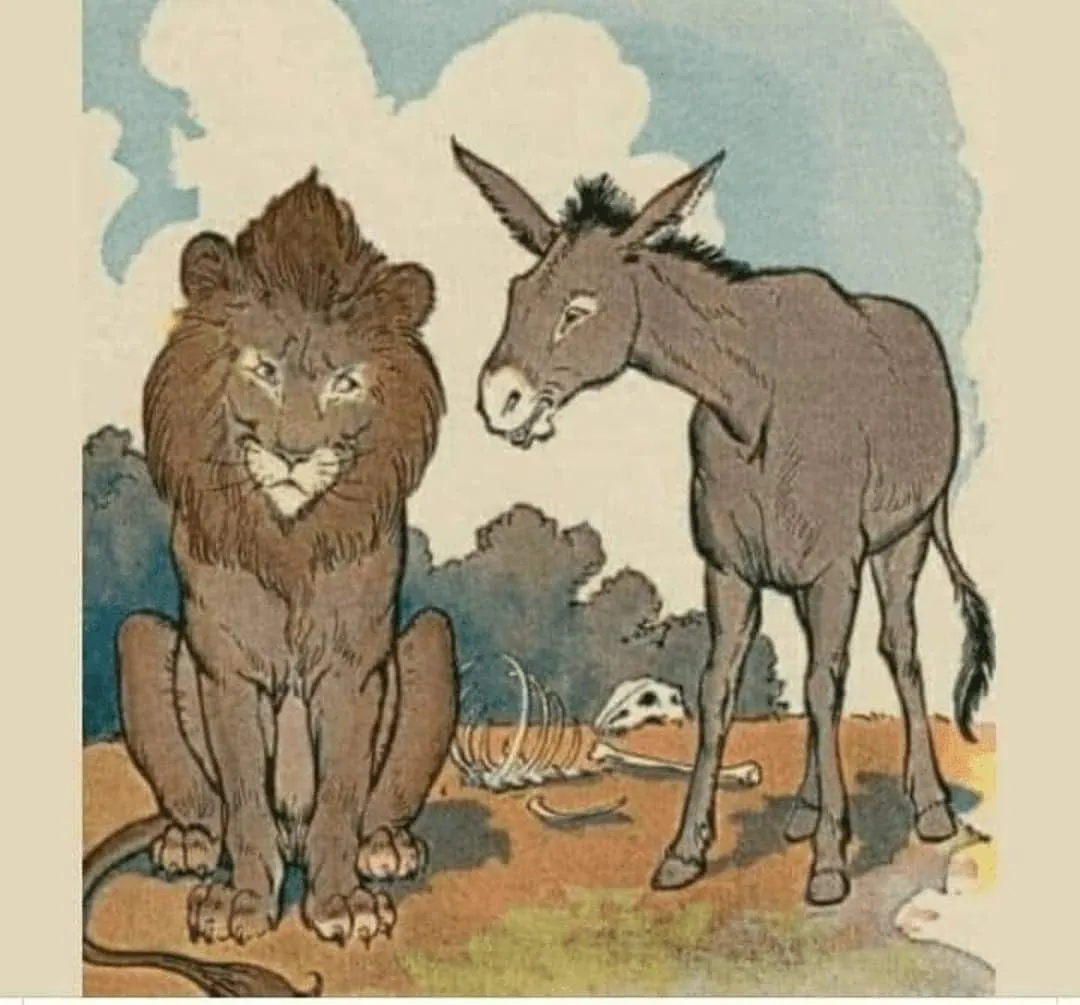
The fable's moral appears to be:
"Don't bother arguing with fools about something they say that's obviously false, because you won't change their mind and just waste your own time."
That's my most charitable interpretation of its intent.
But if that is actually the intent, it's already a bad message, because fools who believe things that are obviously false have an unfortunate history of making the world dramatically worse, which ratchets up when those fools either have power themselves, or can appeal to authorities with power (as happens in this fable).
That is basically my thesis, but here are some additional points:
- The color of grass is a really bad example for the disagreement, because perception of color is subjective and it's entirely possible that two individuals really would see different colors. And no, I don't think that's the point. As I said, I think we're intended to view it as an obvious fact that grass is actually green.
- The moral of this fable is delivered by an authority figure, the lion, who is literally the king, and yet he ultimately punishes the tiger for bothering him about the argument regarding the color of grass. This is a very public school teacher "Don't feed the trolls" type of position, with the difference that taking petty arguments to a teacher really does interrupt them performing their responsibilities, whereas the king's job is literally to make judgments on things.
- Which leads right into the third point: A harried judge might throw out your court case, but they wouldn't punish the plaintiff instead of the defendant (and actually, since the tiger and the donkey agreed to take their case to the lion, it's not really clear whether either of them fit into either category). Nobody here should've gotten punished, and obviously nobody should have asked for someone to be punished. But on such an occasion, the appropriate action for the authority is to say-- both of you, go home.
- Before punishing the tiger, the lion tells the donkey that if he believes the grass is blue, the grass is blue. Which, if we're supposed to believe is objectively false, is a terrible thing to tell someone. If we're not supposed to believe that, then a lesson on subjective perception would've been in order. The lion didn't give one.
- People change their minds about foolish beliefs all the time. It's by no means necessarily a waste to talk to them about those beliefs. Sure, you wouldn't want to go about it as the tiger did here, but it's incredibly insulting to the donkey to suggest that he's so deluded that he could never see the truth, and also you literally cannot change the world if you don't change minds, and that includes the minds of fools. Of course you may find yourself hitting a brick wall when you do that, but it's your call to decide where that wall is, and what action you take based on your encounter with it. Do you keep going? Ignore them? Block them? Your call. It's your time-- you decide how to spend it.
Going back to why this is a bad message on its face, the donkey here has at least some power over the tiger, because he can go to the king and ask the king to intervene forcefully to punish the tiger-- which the lion does end up doing.
It really matters when someone is wrong about something consequential, where their wrongness impacts others, which I think is purposefully obscured by the fable choosing the color of grass as its example. Even when the impact is passing along untruths to others that don't cause observable harm, that's not a good thing. That's something to prevent, if possible.
...Just not by asking an authority to punish the person who disagrees with you. Maybe if the donkey and tiger had gone to a scientist rather than a king, they'd have found someone who could actually address their disagreement and probably wouldn't try to punish anyone.
Of course the metaphor here strongly suggests the donkey wouldn't listen even to the scientist, but again, you don't know that. And it's pretty irresponsible to just call someone a stubborn fool for not listening to you when you haven't even tried to make an argument.
EQUALLY, you have the perfect right to call someone a stubborn fool when you have made the argument and they don't listen, or the 30th time you see someone state the false thing and you know full well they've been exposed to the truth repeatedly but failed to recognize it, and nobody's saying you need to have endless patience for sea lions (which would've been a good addition to this fable). Blocking and moving on is entirely justified if that's what you want to do.
So basically I guess my point is-- there's a kernel of a good message in here, but it's ruined by the story itself. You can't teach any kind of valuable lesson about wasting time educating the unteachable in a story that literally shows the unteachable exerting the power of authority to punish you for your (correct) beliefs. That, uh, kinda sends the exact opposite message.
